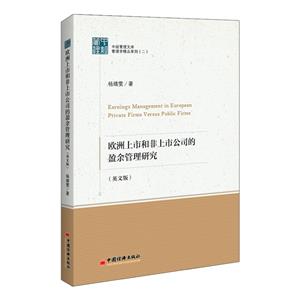-
>
以利为利:财政关系与地方政府行为
-
>
立足饭碗 藏粮于地——基于中国人均耕地警戒值的耕地保护视角
-
>
营销管理
-
>
茶叶里的全球贸易史(精装)
-
>
近代华商股票市场制度与实践(1872—1937)
-
>
麦肯锡图表工作法
-
>
海龟交易法则
气候变化的应对:中国的碳中和之路
¥52.6¥86.0雅舍小品全集
¥18.4¥58.0零基础漫画日语入门-看漫画学日语轻松快速入门-白金版
¥17.6¥43.6中国历代碑志文话(上中下)
¥66.1¥186.0
欧洲上市和非上市公司的盈余管理研究(英文版) 版权信息
- ISBN:9787513658836
- 条形码:9787513658836 ; 978-7-5136-5883-6
- 装帧:一般胶版纸
- 册数:暂无
- 重量:暂无
- 所属分类:>>
欧洲上市和非上市公司的盈余管理研究(英文版) 内容简介
自20世纪80年代起, 盈余管理一直是会计学界研究的热点问题, 但很多研究都是围绕上市公司展开。然而, 仅关注上市公司, 往往无法区分盈余管理是基于会计的监督还是资本市场压力的影响。因此, 比较上市公司和非上市公司有助于评估资本市场压力对盈余管理的影响。另一方面, 非上市公司作为市场经济中的重要组成部分, 和上市公司在规模、所有权和内部管理上都存在着较大的差异。而这些差异也有可能造成公司参与的盈余管理的动机和程度有所不同。所以, 通过对非上市公司盈余管理的研究, 也能丰富人们对其财务报告质量的了解。
欧洲上市和非上市公司的盈余管理研究(英文版) 目录
ContEnts
Chapter 1 Introduction
1.1 Background information and motivation
1.2 Objectives of the study
1.3 Research design
1.4 Main empirical results
1.5 Contributions
1.6 Study organisation
Chapter 2 Literature review
2.1 Introduction
2.2 Private and public firms
2.2.1 What are“private firms and public firms?”
2.2.2 The differences between private and public firms
2.2.3 How are private firms’financial reporting regulated across countries?
2.3 Earnings management
2.3.1 Concept and definitions of earnings management
2.3.2 Theoretical frameworks of earnings management
2.3.3 Measures of earnings management
2.3.4 The motivation of earnings management
2.3.5 Prior empirical evidence on earnings management of private firms versus public firms
2.3.6 The review of earnings quality
2.4 International Financial Reporting Standards (IFRS)
2.4.1 Arguments for and against IFRS adoption on earnings management
2.4.2 Empirical evidence on IFRS adoption and earnings management
2.5 Factors affecting earnings management between private and public firms
2.5.1 Country-level factors
2.5.2 Firm-level factors
Chapter 3Earnings management in European private versus public firms
3.1 Introduction
3.2 Relevant literature and development of hypotheses
3.2.1 Literature on earnings management
3.2.2 The effects of mandatory IFRS adoption on earnings management
3.2.3 Country-level factors and earnings management
3.3 Data and research methodology
3.3.1 Data collection and sample selection
3.3.2 Research methodology
3.4 Empirical results
3.4.1 Descriptive statistics
3.4.2 Univariate comparison between pre- and post-IFRS adoption
3.4.3 The influence of country-level factors
3.4.4 The effects of the financial crisis
3.5 Conclusions
Chapter 4Accrual based earnings management in European private versus public firms
4.1 Introduction
4.2 Relevant literature and development of hypotheses
4.2.1 Comparing earnings management between private and public firms
4.2.2 The effects of mandatory IFRS adoption on earnings management
4.2.3 Factors affecting differential earnings management between private and public firms
4.3 Data and research methodology
4.3.1 Data collection and sample selection
4.3.2 Research methodology
4.4 Empirical results
4.4.1 Descriptive statistics
4.4.2 Regression analysis
4.4.3 Variables that could have influenced the differential
earnings management between private and public firms
4.4.4 Additional tests
4.5 Conclusions
Chapter 5Real earnings management in European private and public firms
5.1 Introduction
5.2 Relevant literature and development of hypotheses
5.2.1 Literature on real earnings management
5.2.2 Real earnings management in private and public firms
5.2.3 IFRS adoption and earnings management
5.2.4 Factors affecting differential real earnings management between private and public firms
5.3 Data and research methodology
5.3.1 Data collection and sample selection
5.3.2 Research methodology
5.4 Empirical results
5.4.1 Descriptive statistics
5.4.2 Regression analysis
5.4.3 Additional tests
5.4.4 Analyses of incentive-based real earnings management
5.5 Conclusions
Chapter 6 Summary and conclusion
6.1 Summary of the study
6.2 Research implications
6.3 Limitations and suggestions for future research
Reference
AppendixContEnts
Chapter 1 Introduction
1.1 Background information and motivation
1.2 Objectives of the study
1.3 Research design
1.4 Main empirical results
1.5 Contributions
1.6 Study organisation
Chapter 2 Literature review
2.1 Introduction
2.2 Private and public firms
2.2.1 What are“private firms and public firms?”
2.2.2 The differences between private and public firms
2.2.3 How are private firms’financial reporting regulated across countries?
2.3 Earnings management
2.3.1 Concept and definitions of earnings management
2.3.2 Theoretical frameworks of earnings management
2.3.3 Measures of earnings management
2.3.4 The motivation of earnings management
2.3.5 Prior empirical evidence on earnings management of private firms versus public firms
2.3.6 The review of earnings quality
2.4 International Financial Reporting Standards (IFRS)
2.4.1 Arguments for and against IFRS adoption on earnings management
2.4.2 Empirical evidence on IFRS adoption and earnings management
2.5 Factors affecting earnings management between private and public firms
2.5.1 Country-level factors
2.5.2 Firm-level factors
Chapter 3Earnings management in European private versus public firms
3.1 Introduction
3.2 Relevant literature and development of hypotheses
3.2.1 Literature on earnings management
3.2.2 The effects of mandatory IFRS adoption on earnings management
3.2.3 Country-level factors and earnings management
3.3 Data and research methodology
3.3.1 Data collection and sample selection
3.3.2 Research methodology
3.4 Empirical results
3.4.1 Descriptive statistics
3.4.2 Univariate comparison between pre- and post-IFRS adoption
3.4.3 The influence of country-level factors
3.4.4 The effects of the financial crisis
3.5 Conclusions
Chapter 4Accrual based earnings management in European private versus public firms
4.1 Introduction
4.2 Relevant literature and development of hypotheses
4.2.1 Comparing earnings management between private and public firms
4.2.2 The effects of mandatory IFRS adoption on earnings management
4.2.3 Factors affecting differential earnings management between private and public firms
4.3 Data and research methodology
4.3.1 Data collection and sample selection
4.3.2 Research methodology
4.4 Empirical results
4.4.1 Descriptive statistics
4.4.2 Regression analysis
4.4.3 Variables that could have influenced the differential
earnings management between private and public firms
4.4.4 Additional tests
4.5 Conclusions
Chapter 5Real earnings management in European private and public firms
5.1 Introduction
5.2 Relevant literature and development of hypotheses
5.2.1 Literature on real earnings management
5.2.2 Real earnings management in private and public firms
5.2.3 IFRS adoption and earnings management
5.2.4 Factors affecting differential real earnings management between private and public firms
5.3 Data and research methodology
5.3.1 Data collection and sample selection
5.3.2 Research methodology
5.4 Empirical results
5.4.1 Descriptive statistics
5.4.2 Regression analysis
5.4.3 Additional tests
5.4.4 Analyses of incentive-based real earnings management
5.5 Conclusions
Chapter 6 Summary and conclusion
6.1 Summary of the study
6.2 Research implications
6.3 Limitations and suggestions for future research
Reference
Appendix
欧洲上市和非上市公司的盈余管理研究(英文版) 作者简介
杨婧雯,女,1991年3月生于湖南邵阳。2010年入英国兰卡斯特斯特大学会计系读书。2013年入英国班戈大学,于2018年获得会计学博士,毕业后加入班戈大学中国校区任教。现为北京第二外国语学院商学院讲师。目前主要从事财务会计教学与会计信息质量,国际会计准则的研究工作。
- >
苦雨斋序跋文-周作人自编集
苦雨斋序跋文-周作人自编集
¥6.1¥16.0 - >
伯纳黛特,你要去哪(2021新版)
伯纳黛特,你要去哪(2021新版)
¥16.9¥49.8 - >
企鹅口袋书系列·伟大的思想20:论自然选择(英汉双语)
企鹅口袋书系列·伟大的思想20:论自然选择(英汉双语)
¥6.3¥14.0 - >
李白与唐代文化
李白与唐代文化
¥9.9¥29.8 - >
罗曼·罗兰读书随笔-精装
罗曼·罗兰读书随笔-精装
¥32.9¥58.0 - >
朝闻道
朝闻道
¥14.8¥23.8 - >
随园食单
随园食单
¥16.4¥48.0 - >
伊索寓言-世界文学名著典藏-全译本
伊索寓言-世界文学名著典藏-全译本
¥6.7¥19.0
-
经营企业与经营人生
¥25.7¥45 -
小米创业思考
¥48.3¥86 -
麦肯锡高效工作法(八品)
¥11.9¥52 -
干法
¥19.7¥39 -
启程:中国企业“出海”实践
¥41.3¥65 -
央企真相
¥20.9¥58
构建新发展格局 推动高质量发展
¥51.4¥80.0高等数学习题与解析(上册)
¥34.8¥52.0海洋生物技术
¥40.8¥49.8医用高等数学
¥38.7¥59.8隧道散体围岩力学参数反分析优化及其施工技术研究
¥47.4¥58.0


















